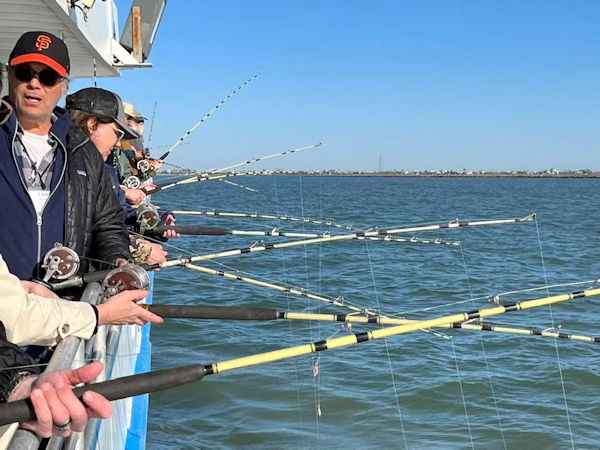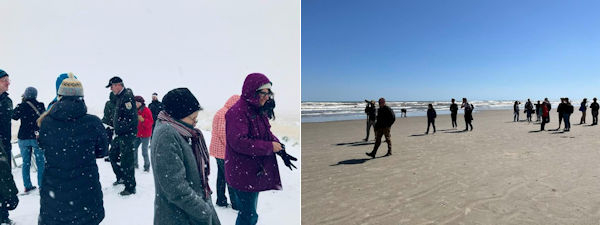SEJournal Online is the digital news magazine of the Society of Environmental Journalists. Learn more about SEJournal Online, including submission, subscription and advertising information.
 |
| Journalists at the conference, in search of the right news hook. Photo: David Helvarg. Click to enlarge. |
Feature Opinion: Houston and Other Disasters at #SEJ2022
By David Helvarg
Recently, writer David Helvarg, the Society of Environment Journalists’ resident humorist (or not, depending on your point of view), managed to break through the SEJournal’s usually impenetrable email cone of silence to pitch us a satirical look at the recent conference, which ran March 30-April 3 in Houston. We sullenly agreed to provide him space from within the limited infinity of our online edition, mainly to avoid future barbs directed squarely at us. We take absolutely no responsibility whatsoever for his resulting musings.
Combining the best of LA’s traffic, Florida’s politics and Chernobyl’s environmental sustainability under Russian tank fire, Houston proved the perfect site for the first live Society of Environmental Journalists conference in the not post but close enough (fingers crossed) COVID-19 era, in which friends and colleagues got to reunite mask to mask.
The opening reception on Wednesday evening included greetings and discussion of sustainability programs from SEJ’s host university, Rice, which given the state’s political heat could find things getting, er, sticky (there’s a grain of truth here).
Later that night, the youthful Harris County attorney explained how, as a racially diverse city, Houston is gas-flare-blue surrounded by a red tide of Republicans who keep erecting legal obstacles to his work, such as insisting that he be carded every time he enters a bar.
Then on Thursday, undecided between the fire, flood, “cumulative trauma” and ever-popular Superfund field trips (did I mention the highway paving tour?), I chose to go fishing … I mean to learn about biodiversity in the Gulf of Mexico.
We’d have had more luck on the boat tour
down the Houston Ship Channel where every cast
is guaranteed to hook a major petrochemical complex.
Here, 40 SEJers got to practice fish conservation by hardly catching any. We’d have had more luck on the boat tour down the Houston Ship Channel where every cast is guaranteed to hook a major petrochemical complex and the fish are pre-battered and oiled.
That evening’s hospitality reception reminded us of how two years of supply chain disruptions have limited the availability of free pens for freelancers, booze and ball caps inscribed “Frank’s Place,” only who’s Frank?
Conference formally gets under wave
Friday’s opening plenary was on the ocean, which is my cup of sea. Speakers included an assistant secretary of state, an evangelical climatologist and an environmental justice leader whose work has long surfed communities that have been historically eel treated. Sharing a common porpoise, they asked we not frigate there are issues we sea lion all around with salmon possible, or almost impossible, to fix and are shore to get worse unless whale start reporting them in depth. Admitting there’s no sole solution, they ask we rays public awareness, seas the opportunity and sand together in finding the best ocean news hooks.
Friday’s panels included “Following the Money” (hint, don’t become a reporter), “Reporting on the Intersection of COVID-19 and Climate Change” (war was unable to attend due to a conflict in Europe) and “Drilling Down: Using Databases To Find Stories on Oil, Gas and Mining” (SEJ’s pun not mine).
The representative from the American Chemistry Council
thanked SEJ for its journalistic objectivity in producing over
1.5 tons of plastic waste just from our conference box lunches.
On an ocean plastic panel, the representative from the American Chemistry Council demonstrated their success with “recycling” by rebranding it “the circular economy” and agreeing that if it’s fully successful by 2040 there’ll be no need to reduce new plastic production. He also thanked SEJ for its journalistic objectivity in producing over 1.5 tons of plastic waste just from our conference box lunches.
Friday night’s beat dinners confirmed Houston’s growing reputation as a world-class food destination, reflecting both the city’s rich cultural diversity and its last connection to the natural world. Among its specialties are Vietnamese Cajun and floating rafts of fire ants (available only during flood season).
Big Oil, Big Corn, Big Boondoggle
Among Saturday’s panels were “Extreme Weather: How to Report on a World that’s Warmer, Colder, Wetter, Drier and Weirder,” previously titled, “Welcome to Houston.”
During a journalism and environmental justice luncheon, Environmental Defense Fund’s community engagement leader pointed out the links between the environment and democracy. “Brown and black voters are more likely to vote on climate policies but how can they if they’re not allowed to vote?” she asked. But folks like Texas Governor Greg Abbot would argue progress is being made: 60 years ago many statehouses passed bills to stop African Americans from voting because they were Black. Last year he signed a bill to stop them from voting because they’re Democrats.
The carbon capture panel was indeed captivating, and heavily attended by journalists who had only a vague suspicion that it might be a Big Oil boondoggle. But after hearing from top experts, they realized it’s actually a Big Oil and Big Corn boondoggle, the two industry groups whose political donations generate billions in Big Government subsidy ratholes, thus completing the circular economy. Also, nothing says 21st-century energy innovation like building more pipelines.
 |
| SEJ members wander in search of climate change, at left in a Colorado blizzard in 2019, at right on a Texas beach in 2022. Photos: David Helvarg. Click to enlarge left, right. |
“The Myth of Absolute Objectivity in Reporting” panel might have been worthwhile, but I can’t say definitively, pretty much in the eye of the beholder I guess. As far as “Untold Stories of Ocean Science,” there might be something fishy there but I haven’t heard.
My mini-tour was a walk in the park compared to the canoe paddle, where they couldn’t touch the dirty water, or the pontoon boat bayou tour, where they saw a small gator, a bunny and its litter, actually lots of litter. I learned people have lived in the Houston plains area for over 13,000 years, proving from an archeological point of view that people have always made questionable choices.
Follow the marching band
Saturday night we were bussed to Rice’s campus, which U.S. News and World Report rates in the top 10 for available parking. We were fed and played lawn games.
Journalists, of course, are not easily led unless you put a marching band in front of them. That resulted in our being herded into a two-story open-air art box where a performance group told us we’d have an epiphany. Mine was you can turn 40 minutes into seemingly infinite time.
Sunday morning we had a writers workshop outside in the arboretum with historian Douglas Brinkley and a panel of four local authors of whom, to keep climate alarmism in perspective, only two have had their homes flooded out. It reminded me of the Miami workshop following a cold snap where we had to watch out for frozen iguanas falling from the trees. But I digress.
What most impressed me about the Houston conference was the
large number of students and young journalists ... likely to be able
to report on what we could not — the end of the environment.
In the end what most impressed me about the Houston conference was the large number of students and young journalists reflecting the racial and gender diversity, commitment and passion of a new well-informed generation likely to be able to report on what we could not — the end of the environment.
I only wish I could be there to see the great things they might yet accomplish in the emerging new media of cave scrawling.
But those are workshop topics for the next SEJ conference. So, what does a salmon say when it hits its head? Dam! And there sure are a lot of dams in Idaho and some of them have to burst at some point, which is why our site selection committee chose Boise, Idaho, for our next conference. Bring your waders.
David Helvarg is an author, writer and host of the Rising Tide Ocean Podcast. You can read his previous satirical dispatches from SEJ conferences in Fort Collins, Colo., Miami, Stanford University and Austin, Texas — or not.
* From the weekly news magazine SEJournal Online, Vol. 7, No. 15. Content from each new issue of SEJournal Online is available to the public via the SEJournal Online main page. Subscribe to the e-newsletter here. And see past issues of the SEJournal archived here.














 Advertisement
Advertisement 



